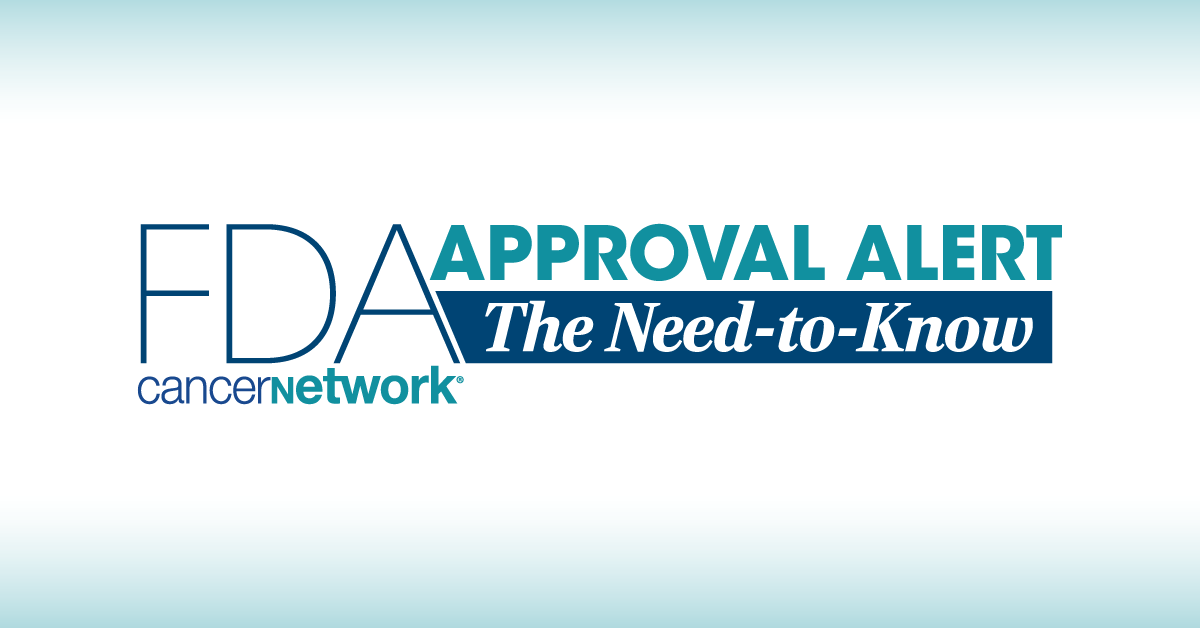FDA Approves Cosibelimab in Cutaneous Squamous Cell Carcinoma
Cosibelimab has been approved by the FDA as a treatment for patients with cutaneous squamous cell carcinoma.
The decision is supported by results from the first-in-human, open-label, dose-escalation phase 1 CK-301-101 trial (NCT03212404).

The FDA has approved a resubmitted biologics license application (BLA) for cosibelimab (Unloxcyt) as a treatment option for patients with locally advanced or metastatic cutaneous squamous cell carcinoma (CSCC) who are not candidates for curative surgery or radiotherapy, according to a news release from the FDA.1
The resubmitted BLA was accepted by the FDA in July 2024, and the agency set a Prescription Drug User Fee Act date of December 28, 2024 to have its decision on cosibelimab reported.2
Initially, a BLA was sent in January 2023 for cosibelimab as a treatment for CSCC.3 In December 2023, the FDA sent back a complete response letter (CRL) that highlighted problems with a multi-sponsor inspection of the developer’s third-party contract manufacturing facility, although there were no concerns with the clinical data package, safety, or drug labeling.4
The decision is supported by results from the first-in-human, open-label, dose-escalation phase 1 CK-301-101 trial (NCT03212404).
Topline data among 109 evaluable patients showed an objective response rate (ORR) 47% (95% CI, 36%-59%) for patients with metastatic disease (n = 78) and 48% (95% CI, 30%-67%) for those with locally advanced disease (n = 31). Additionally, the median duration of response (DOR) was not reached (NR; range, 1.4+ to 34.1+) in the metastatic subgroup and 17.7 months (range, 3.7+ to 17.7) in the locally advanced population.
“The data look quite promising in terms of the overall response rate we would see. I don’t think it should be a big criticism that the data came from a phase 1 trial,” Jason Luke, MD, associate professor at the University of Pittsburgh and medical oncologist at UPMC Hillman Cancer Center, said in an interview with CancerNetwork®. “This is a treatment population that, while fairly common in general oncology practice, is very difficult to accrue patients to because the patients who have this disease very commonly have comorbidities or other medical problems that make them difficult clinical trial candidates.”
Additional findings were published in the Journal for ImmunoTherapy of Cancer.5
In the intention-to-treat population, the confirmed ORR was 47.4% (95% CI, 36.0%-59.1%), and the median observed time to response was 1.9 months (range, 1.6-6.6). The median DOR was not reached (range, 1.4+ to 34.1+ months), although responses were ongoing in 73.0% of patients. A total of 37 patients had an objective response; 6 were complete responses, and 31 were partial responses.
Among patients with PD-L1–positive tumors, the ORR was 45.9% and 44.4% for patients with PD-L1–negative tumors. Durable responses were observed regardless of PD-L1 status.
At the time of this publication, 96 patients were screened, and 78 were enrolled for analyses. Doses were fixed; patients received 800 mg of cosibelimab through intravenous infusion over 60 minutes once every 2 weeks until worsening progressive disease, confirmed complete response, toxicity, or clinical deterioration. Then, patients entered a post-treatment follow-up period where cosibelimab was given on days 1 and 15 of each 28-day cycle.
The median age of patients enrolled was 71.6 years. Also, 66.7% of patients had distant metastatic CSCC, and 70.5% had an ECOG performance score of 1. Per other treatments, 60.3% of patients had undergone prior cancer surgery and 65.4% underwent radiation therapy. A total of 91.0% of patients had not undergone prior systemic therapy. Median duration of follow-up was 15.4 months (range, 0.4-40.5).
Between days 24 and 28, end-of-cycle tumor assessments according to RECIST v1.1 were conducted by the investigator and an independent central review during cycles 2, 4, 6, 8 and every 3 cycles thereafter. These assessments factored into the decision to either begin follow-up visits or add extra cycles to the treatment.
Regarding safety, the most observed treatment-emergent adverse effects (AEs) were fatigue (26.9%), rash (16.7%), and anemia (15.4%). A total of 9 patients discontinued treatment because of an AE, but only 2 were judged to be related to cosibelimab treatment, including 1 patient with pemphigoid and 1 with hepatobiliary disorders.
There were 3 deaths due to AEs, and none were related to the trial treatment.
References
- FDA approves cosibelimab-ipdl for metastatic or locally advanced cutaneous squamous cell carcinoma. News release. FDA. December 13, 2024. Accessed December 13, 2024. https://tinyurl.com/2wdtzrxa
- Checkpoint Therapeutics announces FDA acceptance of BLA resubmission of cosibelimab for the treatment of advanced cutaneous squamous cell carcinoma. News release. Checkpoint Therapeutics, Inc. July 25, 2024. Accessed December 13, 2024. https://tinyurl.com/mr33hn7z
- Checkpoint Therapeutics submits biologics license application to FDA for cosibelimab as a treatment for patients with metastatic or locally advanced cutaneous squamous cell carcinoma. News release. Checkpoint Therapeutics. January 4, 2023. Accessed December 13, 2024. yhoo.it/3GqykPg
- U.S. food and drug administration issues complete response letter for cosibelimab solely due to inspection findings at third-party manufacturer. News release. Checkpoint Therapeutics, Inc. December 18, 2023. Accessed December 13, 2024. https://tinyurl.com/5yewpx4b
- Clingan P, Ladwa R, Brungs D, et al. Efficacy and safety of cosibelimab, an anti-PD-L1 antibody, in metastatic cutaneous squamous cell carcinoma. J Immunother Cancer. 2023;11(10):e007637. doi:10.1136/jitc-2023-007637